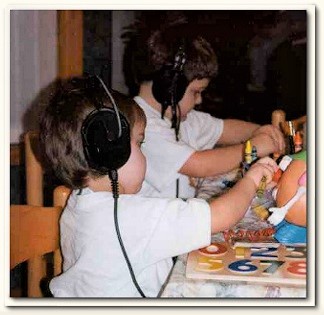Has Autism Caused Problems For You Or Your Child?
If you or your child has been diagnosed with Autism Disorder, then you likely already know some of the symptoms. It may be difficult to communicate with others and pick up on social cues, and it may also lead to a number of repetitive behaviors or hyper-fixations.
 Struggling to make eye contact with others as well as problems understanding body language or the emotional context behind someone’s words are but a few of the experiences a child or an adult with Autism Disorder re-lives on a daily basis. When diagnosed as “high functioning” or “Asperger’s Syndrome” you might even have difficulties putting yourselves in the position of the other person, although you appear to have little or no language or communication issues.
Struggling to make eye contact with others as well as problems understanding body language or the emotional context behind someone’s words are but a few of the experiences a child or an adult with Autism Disorder re-lives on a daily basis. When diagnosed as “high functioning” or “Asperger’s Syndrome” you might even have difficulties putting yourselves in the position of the other person, although you appear to have little or no language or communication issues.
Autism can also bring a sense of inflexibility. You or your child might be distraught at a change of plans. Or you may not deal well with interruptions and become overwhelmed and stressed.
At its most severe, an individual can present as completely nonverbal. Perhaps your child can do little to communicate with you beyond vague sounds and motions, and you worry about their development potential and the quality of their future.
Often, people with autism struggle with relationships and simply want to fit in. If your child has autism, you are likely worried about their social skills and their abilities to function in the adult world. And if you are the one who presents with autism symptoms, you likely want to become more socially adept and flexible.
Autism Spectrum Disorders Are Quite Common

The Ear and the Voice
Dr. Alfred Tomatis, 1987
Many people struggle with these issues. About 1 in 59 children have an autism spectrum disorder, with boys being affected four times more likely than girls. What is less known is that many individuals with autism don’t receive a diagnosis until adulthood.
Autism and auditory processing abilities are strongly connected. Skills in language, interaction, and communication are not developed the same way in individuals with autism as they are in neuro-typical peers. People with autism must learn these behaviors cognitively. While great gains can be made when taking this avenue, often communication and social interaction remain considerably impacted despite years invested into therapy.
Our auditory processing abilities first take shape in our mother’s womb. These abilities continue to develop after birth throughout the first years of life, but can be hampered by a number of obstacles, including autism spectrum disorders.
Individuals with autism often struggle to correctly process auditory information. Their auditory processing abilities vary—some will not be able to understand nuances to speech such as sarcasm, others may be very averse to sudden loud noises due to atypical sound processing, and others still will not be able to discern the sounds in simple sequences such as “mama” or “dada.” Therefore, these children are not able to repeat these simple words to their parents, even if they are already three or four years old.
Because autism is linked to auditory processes—and auditory processing is linked to our ability to interact with others on a social level—Dr. Alfred Tomatis developed a form of auditory training which he already used with children diagnosed with Autism Disorder in Paris in the fifties. Using the Tomatis method, we may be able to train and mature the auditory function, and therefore, increase the social ability of people with autism.
Autism Therapy, With Tomatis Listening Training, Could Be The Next Step Forward
Traditional therapy for autism involves behavioral training. It addresses some of the odd behaviors of autistic individuals and focuses on how they can better integrate into society. While these therapy methods do help with some language skills, they are often mostly integrated cognitively, not emotionally. This can make an individual’s speech robotic or inflexible, and they may struggle with changing the script in different situations.
Tomatis’ auditory training is different. Auditory processing intervention helps integrate language and emotion; this in turn can help individuals with autism function better in the social sphere.
The first step would be to perform a thorough evaluation to see if auditory training is the appropriate path for you. If it is, we would discuss and design a program around you or your child. If it isn’t, we would provide referrals to make sure you or your child are receiving the most suited help for your needs and developmental level.
 For instance, when working with individuals in autism therapy we often focus on melody. Being able to recognize the melody of language helps individuals recognize the emotional content of the words. This is because the two parts are processed by different sides of the brain—words are more likely to be processed on the left, melody on the right. We use this training to trace the auditory function back to when it first began developing, which will allow you or your child to mature the auditory processing ability more naturally than through traditional therapy alone.
For instance, when working with individuals in autism therapy we often focus on melody. Being able to recognize the melody of language helps individuals recognize the emotional content of the words. This is because the two parts are processed by different sides of the brain—words are more likely to be processed on the left, melody on the right. We use this training to trace the auditory function back to when it first began developing, which will allow you or your child to mature the auditory processing ability more naturally than through traditional therapy alone.
We also like to get the family involved with therapy, especially in the case of children. It is important that your family knows how to communicate with each other, and that the individual with autism has a way to practice social communication in a safe environment. Moreover, this takes into consideration the child’s processing speed, attention and discrimination capabilities as he or she progresses through the intervention.
Most of my professional career has been spent working with individuals with auditory processing and learning disabilities. In 1987 I worked in a neuro-pediatric clinic in Hamburg, Germany, where I helped treat nonverbal children on the autism spectrum. The clinic, led by the noted neuro-pediatrician and author, Dr. Inge Flehmig, also had a teaching institute. I became one of the trainers teaching practitioners (from psychologists to pediatricians, OT, PT and SLP) about sensory processing in non-verbal children and how to support communication and language development. Later, I was trained in Autism Diagnostic Observation Schedule (ADOS) tests at the University of Michigan. Following this diagnostic training, I worked as a doctoral intern for several years at the University of Washington Care Clinic, where I diagnosed and treated both children and adults on the autism spectrum.
What makes my practice unique is that I understand the systemic psychology behind autism as well as the sensory-processing, auditory processing and clinical aspects of individuals diagnosed with Autism Disorder. While managing autism can be difficult, we know that—because of the brain’s neuroplasticity—sensory processing functions can be trained. This means that auditory training may be able to help you or your child with autism improve auditory and social interaction and communication.
You may still have doubts about auditory training for autism…
How can sound help autism?
Because autism is linked to auditory processing issues, auditory training can prove very useful in helping treat the disorder. One study shows that music training can provide significant improvements in the social abilities of those on the autism spectrum.
We’ve tried autism therapy and it hasn’t worked.
Auditory processing intervention works differently than other forms of therapy. Traditional therapy relies mostly on correcting the observable behaviors; auditory training focuses instead on the source of communication and language processing, which means that you are more likely to address some of the fundamental areas of functioning. This in turn could help gain measurable, long-lasting results than when using traditional therapy alone.
I don’t have the time or money for autism therapy.
Our method is heavily structured and easier to grasp than most other methods. We do a small amount of focused intervention and then provide breaks so that you or your child can apply what you’ve learned. This means that you are not in therapy for very long; therefore your time and financial resources will follow accordingly. Additionally, we will evaluate the progress with you after every phase to see if this is the most useful route or if a different one should be taken, so you will always be getting the most out of therapy.
Learn More About Auditory Training For Autism
If you are interested in pursuing this form of therapy, I offer a free phone consultation where I will answer any questions you may have. I also offer free monthly presentations. Should you be interested in signing up, please contact me at 206-522-8873. If you are ready to address your autism symptoms, then I am ready to discuss the options we offer with you.
